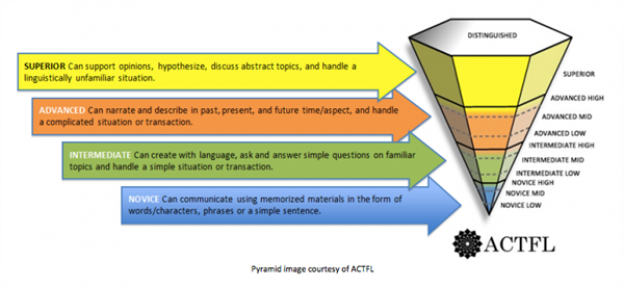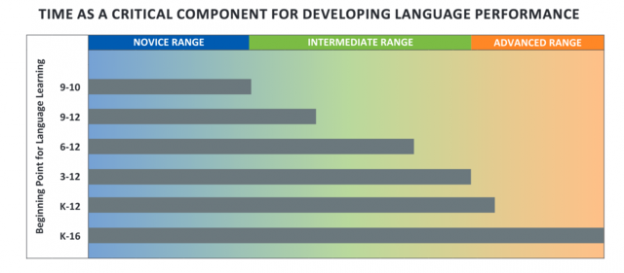Modern Language Proficiency Guidelines


Below, please see the possible range of student achievement of language proficiency by the end of each language/course:
Gr. 5 Spanish- Novice Low
Strategies to get to the next level (adapted from ACTFL/AAPPL Score Descriptions):
Interpersonal Speaking/Listening- When you answer questions, try to use more than one word and even a phrase. Practice asking questions and keep learning new words. Practice asking more questions on more topics.
Interpretive Reading/Listening- Try to understand by looking for clues such as pictures, titles, words you recognize, words that are similar to words in your own language.
Presentational Writing- Practice writing words and phrases. Make lists.
Gr. 6 Spanish- Novice Low
Strategies to get to the next level (adapted from ACTFL/AAPPL Score Descriptions):
Interpersonal Speaking/Listening- When you answer questions, try to use more than one word and even a phrase. Practice asking questions and keep learning new words. Practice asking more questions on more topics. Combine your words and phrases into simple sentences. Keep learning new words!
Interpretive Reading/Listening- Try to understand more by looking/listening for clues such as pictures, titles, words or parts of words that you recognize, words that are similar to words in your own language. Think about what you already know about a topic for additional clues about the topic. Then go back and reread/re-listen and see what more you can understand.
Presentational Writing- Keep a word journal. Every time you learn a new word or phrase, add it to your journal. Practice combining your words and phrases to form simple sentences.
Gr. 7 French -Novice Low
Strategies to get to the next level (adapted from ACTFL/AAPPL Score Descriptions):
Interpersonal Speaking/Listening- When you answer questions, try to use more than one word and even a phrase. Practice asking questions and keep learning new words. Practice asking more questions on more topics.
Interpretive Reading/Listening- Try to understand by looking for clues such as pictures, titles, words you recognize, words that are similar to words in your own language.
Presentational Writing- Practice writing words and phrases. Make lists.
Gr. 7 Spanish- Novice Mid
Strategies to get to the next level (adapted from ACTFL/AAPPL Score Descriptions):
Interpersonal Speaking/Listening- Practice lots of conversations in which you start it, keep it going, and end it; practice asking questions in order to do this. Practice saying as much as you can about yourself. Try to use as many sentences as you can.
Interpretive Reading/Listening- Use what the passage says about the topic to understand the main idea. Try to use different approaches to understanding such as looking/listening for clues such as pictures, titles, words or parts of words that you recognize, words that are similar to words in your own language. Think about what you already know about a topic for additional clues about the topic. Then go back and reread/re-listen and see what more you can understand.
Presentational Writing- As often as possible write about yourself and your life. Write reminders to yourself, write comments, jot down questions that you want to remember to ask. Write as many sentences as you can.
Gr. 8 French-Novice Mid
Strategies to get to the next level (adapted from ACTFL/AAPPL Score Descriptions):
Interpersonal Speaking/Listening- When you answer questions, try to use more than one word and even a phrase. Practice asking questions and keep learning new words. Practice asking more questions on more topics. Combine your words and phrases into simple sentences. Keep learning new words!
Interpretive Reading/Listening- Try to understand more by looking/listening for clues such as pictures, titles, words or parts of words that you recognize, words that are similar to words in your own language. Think about what you already know about a topic for additional clues about the topic. Then go back and reread/re-listen and see what more you can understand.
Presentational Writing- Keep a word journal. Every time you learn a new word or phrase, add it to your journal. Practice combining your words and phrases to form simple sentences. As often as possible write about yourself and your life. Write reminders to yourself, write comments, jot down questions that you want to remember to ask. Write as many sentences as you can.
Gr. 8 Spanish-Novice Mid/Novice High
Strategies to get to the next level (adapted from ACTFL/AAPPL Score Descriptions):
Interpersonal Speaking/Listening- Keep the conversation going by asking follow up questions on the same topic, working with your partner to figure out what you don't understand and talking around words that you don't know. Keep saying more about more topics. Pretend you're in a situation where you need to get something or do something. Jump into as many conversations as you can, especially outside of class. Once you've answered a question, try to add something more (another fact, thought, or even another question).
Interpretive Reading/Listening- Use what the passage says about the topic to understand the main idea and look for some supporting facts. Try to use different approaches to understanding such as looking/listening for clues such as pictures, titles, words or parts of words that you recognize, words that are similar to words in your own language, word and order form. Use what you already know about a topic for additional clues about the topic, and about what the author wants you to understand. Then go back and reread/re-listen and see what more you can understand.
Presentational Writing- Keep writing more about more topics. Add more information; use a variety of vocabulary. Make your writing more interesting by forming sentences or questions in different ways. When you don't know a precise word, try using other words to say what you mean. Frequently review your writing for accuracy and correctness. Look for more outlets or opportunities to write to different people. As you review your writing, see if there are sentences or details that you can link together. Try to add something more (another fact, thought, or even another question).
